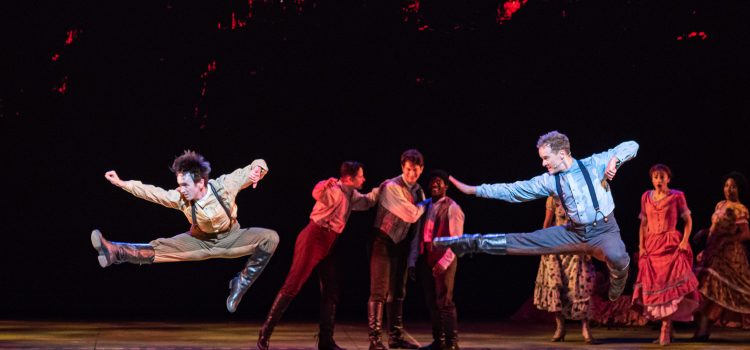By Lynn Venhaus
Inspired by an adored golden-age movie musical 67 years ago, the stage version of “Seven Brides for Seven Brothers” has been updated to rework some of the more problematic portions of the plot for contemporary audiences.
While the Muny’s latest production tries mightily to breathe new life into one of the more neanderthal mid-century musicals, selling the macho characters is a pesky issue to overcome – even with a cast deep with exceptionally skilled dancers and singers.
Head of an all-male household in the mountains, Adam’s caveman way of thinking has influenced his uncultured backwoods brothers. However, they have their ‘teachable’ moments in the revamped book.
The focus on the uncouth siblings becoming more civilized around women – as they have zero experience with the opposite sex – is part of the show’s enduring charm.
They are tutored by their new sister-in-law, the dissatisfied yet determined townswoman Milly (Kendra Kassebaum). Though strong-willed, she is coerced into marrying Adam (Edward Watts) in a weak moment when he comes to town on a woman-hunt.
We can look it this as a ‘glass half full’ or a ‘glass half-empty’ experience.
After all, that is the period. The time is 1850, during the great migration to the Pacific Northwest on The Oregon Trail, when men still acted like women were property, and society felt marriage was in part a financial transaction.
In so many words, people didn’t discuss gender politics. Times, as they tend to do, have changed. But we are still evolving as a society, and theater must address the modern sensibilities to stay relevant. Musical theater, by virtue of its history, is forced to mirror those changes, and this discussion will be ongoing.
As we are painfully aware, during this 21st century, particularly in the last five years, with the #MeToo and #Time’s Up movements, the old-fashioned sexist attitudes on display in the old chestnuts are hard to get beyond. (Think of the abused women in “Carousel” and “Oliver!”). In the upcoming “Chicago,” we hear another side from fed-up females in “Cell Block Tango.”
Thankfully, among the improvements to “Seven Brides for Seven Brothers,” they have removed Adam’s song, “A Woman Ought to Know Her Place,” and Milly’s “One Man.”
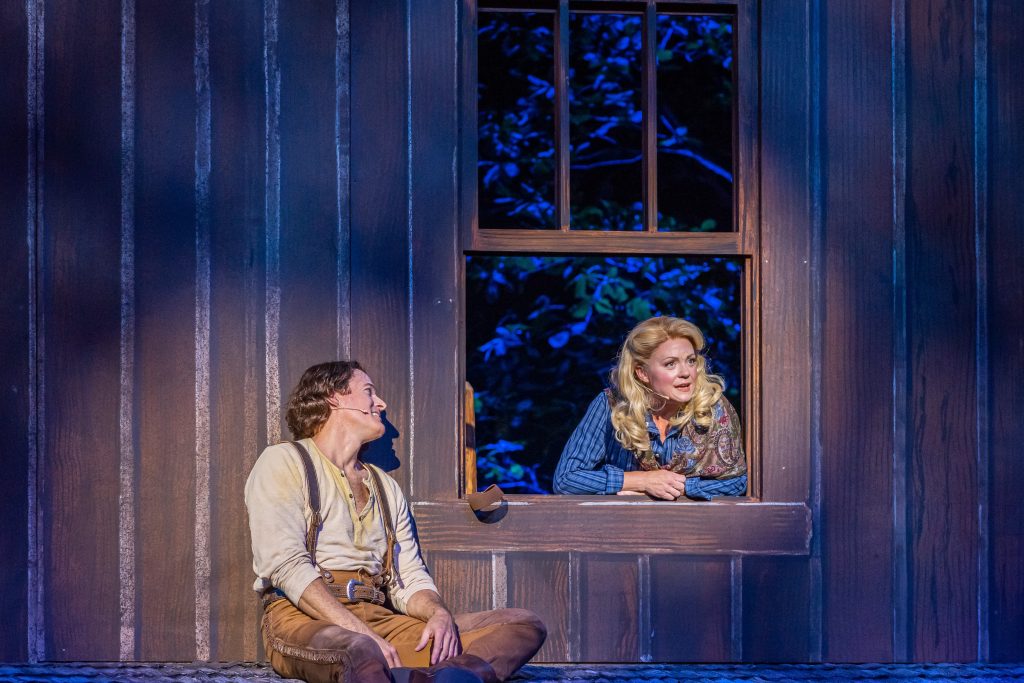
They have added a feisty “I Married Seven Brothers” for a peeved Milly – a highlight for Kassebaum — and “Where Were You?” as a vehicle for Adam to vent his anger from his perspective.
Nevertheless, a musical that is based on a Stephen Vincent Benet short story, “The Sobbin’ Women,” which was shaped by an ancient Roman legend called “The Rape of the Sabine Women,” that’s just hard to spin – and swallow — these days. And the plot hinges on the other six brothers encouraged to kidnap women they took a shine to in town, so that is a controversial hurdle.
And despite a Herculean effort from the Muny’s creative team to focus on a battle of the sexes and bring out the personality and humor, the aggressive song “Sobbin’ Women” and some of the remaining dialogue are wince-inducing, even like nails on a chalkboard.
I know, I know – people generally go to musical theater to be entertained, to escape the realities of daily life and usually aren’t seeking enlightenment while enjoying song and dance. They are just fine taking a respite, blissfully unaware of the real world. They enjoy a bouncy, tuneful musical and take it all in stride.
That’s not me. So, this review is from my perspective. As a friend said, “Every musical is someone’s favorite.” I had to keep reminding myself: “Context.”
It’s like my inexplicable fondness for “Mamma Mia!” Everything screams silly, but I love it, and have seen it at least six times — reminds me of “Gidget” movies when I was growing up, comfort food for the soul.
Under a magnifying glass, many musicals can’t hold up to current scrutiny, but that debate will keep on keeping on.
Peruse a list of musicals from the 1940s through 1970s, and so many female characters are underwritten – typically waiting for a man to rescue her or change her life, which should be annoying to current generations.
Modern musical theater has hopefully moved beyond that. Maybe someday our princes will come, but none of that royal superiority, he’ll be on equal footing, and in the meantime, we’re following paths trailblazed by women who clamored to be heard.
Next week’s “On Your Feet!” will show a true partnership between a husband and a wife, Gloria and Emilio Estefan.
“Seven Brides for Seven Brothers” isn’t the first musical to deal with deception – for starters, the list includes “Light in the Piazza,” “The Most Happy Fella,” “Dirty Rotten Scoundrels,” “A Funny Thing Happened on the Way to the Forum” (and ‘go!’), among others.
And bull-headed Adam and assertive Milly work on trust issues to advance the plot.
People really do have affection for the 1954 movie. It was nominated for Best Picture, losing the Oscar to “On the Waterfront,” but won Best Scoring of a Musical Picture. In 2006, the American Film Institute named it one of the best American musicals ever made, and in 2004, the Library of Congress’ U.S. National Film Registry selected it for preservation because of it being “culturally, historically or aesthetically significant.”
Many fans enjoy the nostalgia, the appealing leads – brawny Howard Keel as Adam and sweet girl-next-door Jane Powell as Milly, plus the gymnastic Russ Tamblyn as youngest brother Gideon, and foremost, those rousing dance numbers.
The Muny drew 6,907 patrons on opening night. This is the sixth time the Muny has produced the show. Taking a cue from a reworked version by the Goodspeed Opera House in 2005, brought in David Landay, an original co-writer of the stage play, to do some rewrites and editing. A female contribution may have been helpful too.
The script feels like whiplash. One minute, the women are acting empowered, and the next minute the guys seem in “Me, Tarzan, you Jane” mode. It’s like when people attempt to update Shakespeare by a couple hundred years, but don’t commit to a wholly new vision.
Oh well. Baby steps. Growth is good.
In recent years, the Muny has resurrected some of the creakier shows and presented versions with freshened books – most notably “The Unsinkable Molly Brown” and “Paint Your Wagon,” both of which I enjoyed.
I was hoping this would be similar. Several members of the “Paint Your Wagon” production team have returned for this reboot, including director-choreographer Josh Rhodes and associate director-choreographer Lee Wilkins, along with music supervisor Sinai Tabak.
The music direction by Valerie Gebert is crisp. Additional arrangements and orchestrations are by Larry Blank and Mark Cumberland. That’s quite a collaboration.
The Muny was one of the first theaters in America to present the stage adaptation of the movie, back in 1978 during a pre-Broadway tryout. The new stage show didn’t make it to Broadway until 1982; its last year at the Muny was 2011.
The music retained from the movie, written by Saul Chaplin and Gene de Paul, with lyrics by Johnny Mercer, includes “Bless Your Beautiful Hide,” “Wonderful Wonderful Day,” “Lonesome Polecat” and “Goin’ Courtin’.”
Al Kasha and Joel Hirschhorn wrote “Love Never Goes Away,” “We Gotta Make It Through the Winter,” and “Glad That You Were Born” for the stage show.
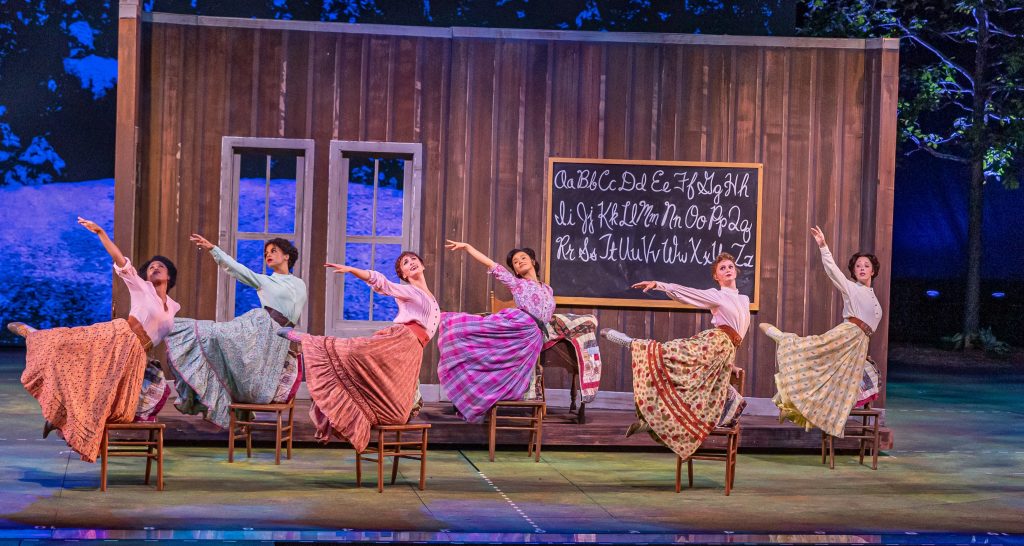
The show has always been considered a major dance vehicle, and five-time Tony Award winning choreographer Michael Kidd cemented his reputation through his robust barn-raising dance and his movements based on reality.
Kidd’s unpretentious style earned him Tony Awards in “Guys and Dolls,” “Can-Can,” “Lil Abner,” “Finian’s Rainbow” and “Destry Rides Again,” and lasting Hollywood admiration (check out Danny Kaye in “Knock on Wood.”)
His uncommon approach transformed frontier chores into rollicking dance numbers. He once said if he had made slobs in the woods break out in ballet, people would have ridiculed it.
And the Muny has assembled an outstanding dozen triple threats to portray the men and women going courting – the Pontipee brothers show off their muscular moves in “The Challenge Dance” at the church social while the maids-in-waiting demonstrate a graceful, sophisticated elegance in “The Quilting Dance.” The finale, “The Wedding Dance,” wraps everything up on an enthusiastic, happy note as a long winter has turned into spring.
Rhodes has emphasized the ensemble’s energy and spotlighted the athletic and acrobatic dances. He helmed an exhilarating “Newsies” in 2017 and has finessed these pieces with vigor.
Kassebaum, who grew up in St. Louis, was impressive as lovable and comical showgirl Adelaide in the 2019 “Guys and Dolls” (and won a St. Louis Theater Circle Award for that performance). She is an emphatic Milly, strong in voice and spirit.
Edward Watts, saddled with a distracting shaggy hairstyle, struggled with the push-pull of that stubborn barbaric character, but is assured in his commanding vocal numbers and a sturdy physical presence as the dominant hero.
The brothers, nowhere near as educated as the snotty East Coast-bred smart-alecks running the town, show plenty of spirit and ‘street smarts’ when they are struck by love and try to impress the town maidens.
Raised to think marriage is the end-all for their young lives learning how to cook, sew and clean, the women must play the stereotype common to the era. But here, they have a tad more gumption, individually attracted to the guys, no matter what their dads say.
Harris Milgrim is a standout as second-oldest brother Benjamin, and lithe Carly Blake Sebouhian’s beautiful movements and ballet-training are noticeable as Martha.
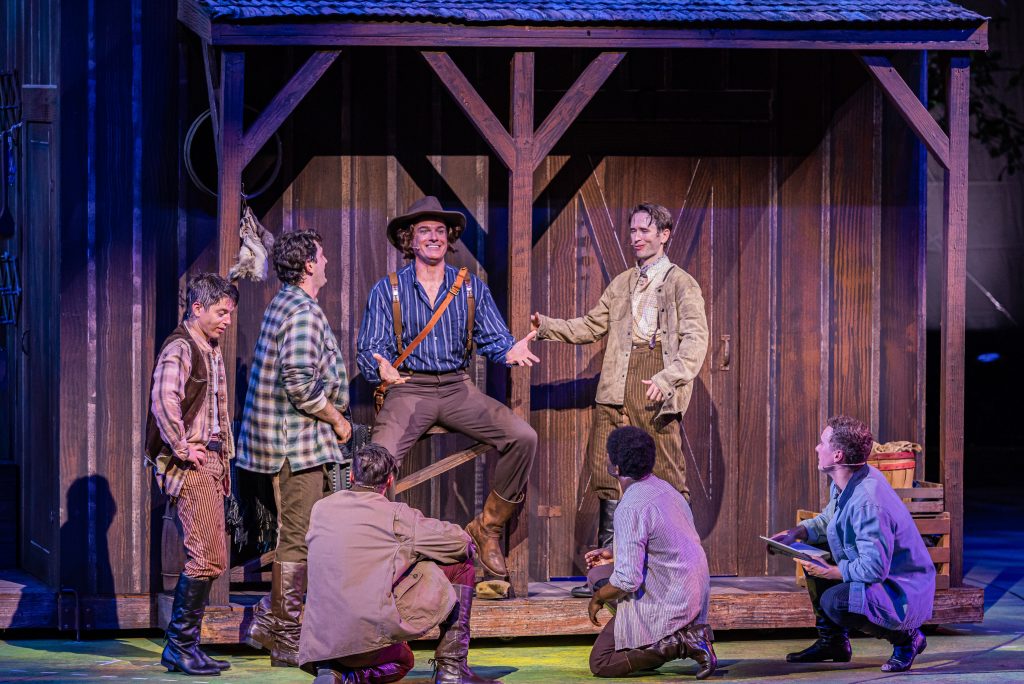
The limber Pontipee lads include Waldemar Quinones-Villanueva as Caleb, Ryan Steele as Daniel, Garett Hawe as Ephraim, 4-time Muny vet Kyle Coffman as the tempestuous Frank, and Brandon L. Whitmore as Gideon.
The supple refined city girls are Leslie Donna Flesner as Dorcas, Shonica Gooden as Sarah, Sarah Meahl as Ruth, Mikayla Renfrow as Alice and Kristin Yancy as Liza.
Michael Schweikardt has provided majestic mountains to convey the grand open spaces and dense forests for the topography while video designer Caite Hevner’s striking work on the changing seasons and the Echo Pass avalanche are spectacular. Schweikardt’s multi-floor log farmhouse is masterful in levels and details.
While some shows like the culturally inappropriate “Flower Drum Song” have unofficially been ‘retired,’ the jury is obviously still out on this show. The passionate performers carry this one here over the threshold
A look back can be a step forward in some instances. The Muny has put a tremendous amount of effort in making this production palatable for its multi-generational audience. Yet, the outdated debate will continue.
As Thursday’s opening night rainout indicated, patience is a virtue. Not to be a Debbie Downer, this isn’t a step backwards, but some of us are ready to move on.
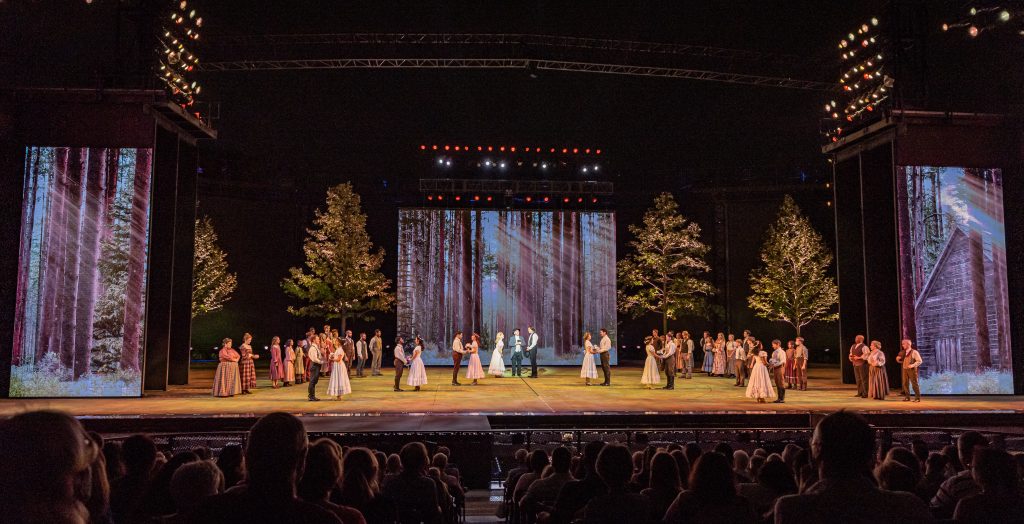
“Seven Brides for Seven Brothers” is at 8:15 p.m. through Wednesday, Aug. 18, at the Muny outdoor stage in Forest Park.
The shows remaining are Seven Brides for Seven Brothers (Aug. 12 – 18), On Your Feet! (Aug. 21 – 27) and Chicago (Aug. 30 – Sept. 5). For more information, visit muny.org.
Tickets can be purchased in person at the box office, online at muny.org or by phone by calling (314) 534-1111.
To stay connected virtually and to receive the latest updates, please follow The Muny on their social media channels, including Facebook, Instagram and Twitter.
Muny Photos by Phillip Hamer.

Lynn (Zipfel) Venhaus has had a continuous byline in St. Louis metro region publications since 1978. She writes features and news for Belleville News-Democrat and contributes to St. Louis magazine and other publications.
She is a Rotten Tomatoes-approved film critic, currently reviews films for Webster-Kirkwood Times and KTRS Radio, covers entertainment for PopLifeSTL.com and co-hosts podcast PopLifeSTL.com…Presents.
She is a member of Critics Choice Association, where she serves on the women’s and marketing committees; Alliance of Women Film Journalists; and on the board of the St. Louis Film Critics Association. She is a founding and board member of the St. Louis Theater Circle.
She is retired from teaching journalism/media as an adjunct college instructor.

